This is the last in a series of eight articles with some of the people involved with the Digital Lifestyles conference day at IBC2004.
Simon Perry interviewed Miriam Segal, from Tailor-Made films on the perils, and bright future, of interactive broadcasting.
Tailor-Made Produced the quiz show “Come and Have a Go if You Think You’re Smart Enough”t for the BBC. An innovative use of mobile phones, satellite broadcasting and motorbike technology, the programme allowed users at home to play for prizes using a secure Java application on their handsets .
Simon Perry: Can you give us a background on Tailor-made Films and what your role is in it?Miriam Segal: Tailor-Made Films is a feature film company that has been running for just under four years. It was set up on the back of me having worked for the BBC both in television and film, but largely as an independent – supplying product back into the BBC as an independent producer, realising that the economics don’t add up. You need to have a company to both give you an ability to negotiate better profit margins and also more editorial control.
It sort of evolved as it has gone really – it has grown as it has gone, and I am the Managing Director and I suppose the creative focus of the company.
Where I know Tailor-made Films from is the “Come and Have a Go” TV series that you did for the BBC, which I thought was world-leading in its use of integrating technology and a TV. A really exciting concept and I could outline it but perhaps it would be better if you did.
Well it was. The most important thing for me is that it came from not understanding anything about technology. It came from wanting to tell a story which is how I start everything really. Ostensibly I felt there must be a way to allow complete accessibility from the home so that you weren’t part of a pre-determined selected group of people that the broadcaster had power to determine whether you looked right, whether you were the right intelligent bracket, right class whatever.
So, we came up with a concept from absolutely a position of naivety as to whether it was profitable. I figure if we had taken it to any other Broadcaster it would probably have fallen foul of a fear of new technology but we worked with them for about sixteen months in the media division to make that possible.
It was a very useful collaboration for Ashley Highfield’s group of employees because they had to constantly reinterpret and re-look at how to make something that can be exceedingly complex very simple and straightforward. Therefore every time we hit a wall, we then worked round the wall or smashed through it to find a way that I primarily can understand and therefore the viewer could too.
It was a quiz show that allowed the whole of the UK to take part because it went to three platforms – PCs, Interactive TVs and also Java enabled phones.
Yes, the USP of the show is that anyone can take part in with no barriers and have an equal chance of winning. We knew that interactive television was a platform in the UK, mobile phones was an interesting one because in the first series we didn’t include SMS but from now on both in the UK and internationally we will, and that came down to a commercial decision and one of an ability to know that we could collate the information quickly enough.
There is a limitation on the SMS capability.
Yes there is a limitation through traffic – but one of the absolutely imperative things about the show, because people are playing for money, is that nothing gets lost – no information goes by the wayside and obviously you’re aware that SMS do go adrift and appear about three days later. In this case could be never be allowed to happen, because if you have been playing and you get all the questions right and your SMS message never turned up then there would have been an outcry.
So, it was that, and it was the financial problem, and in the UK the networks don’t speak to each other. In terms of getting any kind of pricing across was impossible at that stage in the time we had, and also I think that we didn’t want it to be a show where you were essentially waiting for the answers.
We wanted it to be competitive, therefore, and there was a restriction that participants needed to send single SMSs. At the stage we were at in evolving the show ten/twelve months ago it was felt that it would be an impedance, so Java was something that BBC New Media were very keen to find further uses for although it is slow to evolve in the UK as a system.
What is great about the BBC is that they were prepared to back the experiment. It worked, it was a difficult experiment, and we had some teething problems with it and it had a very small pick-up. but I think it set a blueprint for how to exploit the format both again domestically but more importantly internationally where Java and (in America) where Brew are much bigger, modes of usage and it is much easier for the show.
The figure for the Interactive TV and the Web stuff was strong but on the Java download, people needed to know that they had to download an application in advance of the TV show, and be savvy enough to be able to download it.
I think the mistake we made last time, in an attempt to make everything very simple, we overcomplicated the instructions both on the screen to the user and also when they downloaded. All three platforms actually were over-explained and I think that is something we have learnt from.
It is interesting that both we and the BBC see that the first series was a bit of an experiment and that when you are doing something so new, you need to learn from that experiment. Audiences, of course, don’t give a monkey about technology. They want the effect, they don’t care about how you get the effect and that was always the intention somewhere along the line. We over complicated that, and what’s been interesting: looking at its international exploitation – every country is different and every country’s use is different at this stage in the evolution.
What is brilliant about the show is that it can change dependent on its environment. For example in America it’s obviously going to be hugely web based and Brew-based. In the Philippines, you know, it would be entirely SMS-based.
They are madly keen on Mobiles in the Philippines, aren’t they?
Yes, obsessed. In Italy as well – it’s interesting in Italy the telcos say that there is 150% ownership of mobile phones because they all have one and a half mobile phones.
We kind of refer to them as cousins – the three cousins – and it depends upon where you are in the world as to which is the primary cousin. The UK is highly unique and so far ahead of everywhere else in terms of satellite and digital terrestrial.
Actually, what happened is that 85% of people who played were on Freeview. It was imperative again to make it democratic. Through our policy we were adamant that we couldn’t exclude Freeview users. Having said that we also knew that return pathways was so slow in terms of the amount of calls that it could get the information from quickly.
Then we decided to lose that element of it altogether. The minute we lost the need to make the phone calls, so to speak, it meant that Freeview and Sky could be brought into equal treatment.
Didn’t you use an interactive voice response to get them through the next level of questioning?
Not voice response. Built into the game play was a system that actually created a code if you got over a certain call threshold. If you got that code you were asked to call a phone number to give out the code. If there was a tie for the top score then an automatic callback took you through a series of questions which you answered on a keypad on your IBR line. They were still skill based, but they were number based answers and that was time factored as well. To be honest I think the most ties we ever got was six.
Then obviously sending the bikes out with the Satellite cameras on the back…
Yes.
That was brave.
Yes, I mean it is interesting, it would have worked. It is a weird thing, this is the one thing that scared everybody, not me, but the BBC that the traffic system would hold it up. But, interestingly, it never was a problem. We managed to get transport there, always. The problem was that the technology is unbelievably difficult and if you can get a clear southern horizon and if you can’t get enough height you just don’t get a signal. It doesn’t matter in Iraq because obviously you have got huge open spaces but in the middle of Leeds or London or any inner city, it is bloody difficult and it let us down a number of times. Even when we got it really good, eventually when we had to send two or three units to each location so that we could two or three feeds back, it is still not very good.
In the end, there is massive scope for evolution.
That’s funny isn’t it? You would imagine that all of the techy part would be the difficult part not the actual shooting and simple transmission – or what it would appear to be simple transmission.
One of the things we are looking at in the States is doing it better. Actually doing it through broadband connection because. . .
You mean people go out and buy a webcam and stick it on their PC…?
Yes, the problem with that obviously is that you can’t rely that everyone’s got one.
One of the things we are looking at in the States, obviously partly because it is such a huge country, is bringing people to pre-appointed places in which there is already a broadband connection established with a private network. The other thing you can’t have is do it with the net, and then something happens on the net and the whole thing falls over.
JVC have developed a data compression camera that should, in theory, send back a picture that is a better quality than you would get on a webcam or through a satellite link. It spits it back out of broadcast and that is what we are exploring at the moment. That’s what I mean about the show having to evolve as it travels.
What do you think of the idea of including the general public sitting in their homes and TV shows doing more with webcams? Do you think that is something that’s got legs?
I do but I think there will always be a problem until the picture quality is better. Recently during the terrible thing that happened in Russia the pictures initially were awful they were very badly pixelated and the layout was terrible but nobody cares in that situation you just want the news – you want the pictures.
I think that in an entertainment show the general public just presumes that technology will work and don’t care and get very cross when it doesn’t. Obviously, in the end, people want their television programme and they want it delivered in the best possible way. I think you can get away with it in something like Graham Norton where it down as a sort of MTV spying on the street or whatever.
Apparently people are developing a laptop form of this which should be better and until that technology is better evolved, I think it is going always going to be a bit of an impedance.
It is funny because people on different devices have different tolerances to different video qualities. Maybe they have been so used to having high quality on TV, and with CNN running satellite cameras have started introducing people to lower grade quality. It is something that they have just become more tolerant to.
If I watch a video on my mobile phone you would kind of accept that it is not going to be perfect that is because it is a phone.
If you sit watching television and you have cinema quality and suddenly you get a naff sort of pixelated picture, the brain doesn’t compute because it is coming out of the same source.
If you look at content on your mobile phone, or even on your computer, I think still, people accept it is not a TV.
When you go to the Cinema, if you have a negative that is any way dirty and you don’t know what that measn, and suddenly the picture becomes grainy or breaks up or there is hair in there somewhere, you get very cross because you, the punter, don’t understand why because you’ve just paid 7 bucks or 9 bucks – it is supposed to look like it always does. I think that is fair enough. They have paid for something and they expect it to be delivered whereas back in the stone ages people were amazed that they could get colour.
I think there is an expectation within the public now. The advances have been so rapid over the last five/ten years with communication equipment that there is just an expectation that things will continue accelerating at the same pace, if not more so and when they don’t people start thinking “Well what is going on? Why isn’t it?” Whereas previously, they were completely amazed at anything that could happen, now you could show them the moon on a stick and they would say “Oh, right”.
You are absolutely right.
My grandmother is 92. I say to my nieces and nephews that when their great-grandmother was a kid they didn’t really have any aeroplanes or cars, in great use and for me that it is extraordinary how much has changed.
But, I think for a new generation, teenage kids, it is exactly that “We have got all the gadgets, why don’t they work?”
Now they should work because of course they are there so they must work, but, we haven’t grown up. We haven’t evolved through a generation where people landed on the moon and TV actually happened. We had television and then it became colour and you could get it 24 hours and it is all happening so fast, as you say.
When you touched on the Cinema side and the quality of the print it made me think about digital cinema. Is that something that you are excited about – the ability to distribute films to venues that aren’t really cinemas but have digital projection and are laid out in a different way? Is it something you have applied any thought to?
I am excited about accessibility because I think it is terribly important that the Third World or the developing world has the same accessibility as the First World and that the first thing I would say. I’m an old- fashioned girl where it comes to the quality of film. I love the grain in film and I love the colour and the definition that you get from proper lighting. I think it works for things like Star Wars and stuff but when you are talking about a film that is narrative-based and its about tone and colour, it’s key. It’s is weird, I am split – but accessibility is terribly important.
There is something wonderful about an old black and white photograph that a digital photograph can never ever reproduce. I think, as time goes on, again technology will outstrip itself but in that sense I tend to be a bit old fashioned.
Yes – you’ve mentioned black and white photographs. Ilford went into receivership just recently as you know they were a famous UK manufacturer of primarily black and white films. It is a significant change and a big loss.
Well again you see – I think is all to do with impatience. It is why fast food is so important.
It is instant gratification.
I used to do a lot of photography and I used only black and white, and I used to use Ilford.
One of the big changes that is happening in the US or it has happened but has yet to show its relevance to the US market is the Murdoch purchase of DirecTV. Obviously they have stormed the UK with Sky over here and the dominant digital distribution platform, and have had a big effect on what people expect from interactive content as well.
What do you think is going to be happening in the US? Is it going to be forcing the Broadcasters’ hands over there when Murdoch starts really changing around what is going to happen with DirecTV?
America has had so much choice for so long, so it is not like the UK.
When Sky came along we were still a four channel environment, even a three channel environment actually, so it was a market to be grabbed. I think in the US the market is already so full of choice that it is going to take longer for people to care and it’s very much a computer market. People are used to being able to order on-line; even order through, they have free phone calls here so they watch a programme they like a pearl necklace and they can make a phone call.
I think America on the one hand is so far ahead of itself, but also antiquated. Even DirecTV will tell you – we have talked to them about the show and they think it is going to be three years before interactivity really starts to impinge. The American broadcaster could not be less interested.
It does seem that the US is, as you say, uninterested in interactive TV but do you think that is because of the dominance of the PC platform? When you look at interactive TV against what you get on the web then it’s “Well, why would I bother?”
It is unbelievable the amount of time people spend on their computers and are used to being able to select and choose on demand what they want, and also TiVo is used here. Personal publishing, the ability to actually decide what you watch, when you watch or the intelligence of your machine to find programmes for you, you might have forgotten to record and edit out the adverts. I think it is going to be a hard sell here. It will get there, but I just think it is going to be a hard sell.
I guess the thing is with interactive TV you are basically comparing an eight bit platform with 128 bit – 64 bit whatever it is, and that games consoles and the computers are hugely more advanced because the interactive set top boxes have to be built to a price and once you install the base of it you just can’t upgrade those.
Sky obviously did when they went to digital but I think that was more on protection of content than the ability to offer better interaction.
There are so many different boxes here it is very hard for a national broadcaster to get anything that will actually work on every box, whereas in the UK you are working to two systems.
Obviously you have done advanced stuff on the interactive TV – do you think there is any room at all for interaction or other medias being incorporated to film content? I am not talking about “Press 3 and he kisses the girl and Press 4 and they get divorced” because I think everyone went down that path a long time ago and realised that it’s not interesting for the audience and is unbelievably expensive to create.
I don’t think there is in cinema that I can see although, interestingly, I noticed whilst I here that Predator vs Alien has been running a kind of net vote as to who should win, although it doesn’t affect the ending. I think in television narrative, there is – and I think that then allows the audience to continue the experience after the episode has finished. It’s just working off a desire for people to have things quicker. If you create something that has a dramatic enough hook and then you allow the audience to personally continue that inter-relationship, that is something that people will respond to very positively.
In a cinema it is difficult because you are not in control and though you are sitting amongst a lot of other people, but you would have to go into cinema votes and that is just never going to happen because people expect their two hours of passive entertainment and then they go.
People quite often have given up going to the cinema in the UK just because so many people are using their mobile phones during the films, not necessarily talking but there is a lot of texting going on.
Well I just scream at people.
In America they actually stop you as you go in and ask “Have you turned your Mobile phone off”?
It is interesting that cinema tickets are up across the world. I think in the UK last year 26% more people went to the cinema. I think people enjoy the public experience still.
I won’t go into the rights and wrongs of vending out sweets and popcorn endlessly.
Last question is about your top three video games, if you have a top three?
I’m not the person to ask really. I have done some research on it because of what we are looking at evolving in terms of material. I don’t have time. What I can tell you is I have looked at things like Vice City – I find some of them so appallingly depressing, and the violence in them is terrifying. There was a brilliant documentary on called The Hamburg Cell on Channel Four last week about the September 11 bombers and in the advert breaks they kept advertising this new game about Vietnam, and I just thought “How tasteless.”
That was in two or three of the commercial breaks?
Yes, in about three of the commercial breaks – here was a very sensitive piece of very brave broadcasting looking at the fact that the people who blew up the Twin Towers were actually human beings and were sort of “level four” and in the advert was being promoted, very heavily, a very violent game about being in the Vietcong and blowing people’s heads off. It was just extraordinary – the counterpoint was unbelievable.
Games are not the only medium that has pretty gruesome material – you know films have had it, TV has had it and books have had it but for some reason the finger often gets pointed at games doesn’t it?
Well that is not quite true – there is censorship in films and TV, particularly Television because it is an accessible medium. In films there are very violent films but they are very heavily rated and very heavily policed.
Games are the same – games have certificates of ages to play.
You know as well as I do that the access to them is pretty easy. You can access them over the net pretty easily even if you can’t go and buy them. People think they can get away with them because they are cartoons. I can’t remember the name of it something like Vice City but you can actually go and literally batter to death a prostitute.
So the fact that you are taking the role on rather it being shown as a third party?
Exactly – and it is not even that I object to, it’s influencing people. I would worry that this is actually what sort of society are we in, that it is fun to blow the brains out of somebody.
I have played Harry Potter for example and I love it. It’s great, you know, it is beautifully presented, and is fantastic fun, it is like being in a movie. So, for me I think there is a great place for games I just don’t see why they have to resort to this need to sort of go around killing everything that moves.
I wonder if it is just a phase that games are going through – it may be a long phase, but film went through a very violent period. If you look through the seventies early eighties there were some incredibly violent films around, but everyone just said “Well OK we’ve been through that and we will get on to the next thing.” Within the growth period of gaming maybe it is just a phase it is going through and it is going to mature. There seems to be a will within the gaming industry for it to go to other more interesting places.
Well, I hope it will and I think it will, because eventually there is only so much you can do – unfortunately we are living in an increasingly violent world, if you look at last two to three decades.
It depends on the environment we live in: if you live in a very safe and peaceful world there will always be people who want to watch pornography and people killing each other but you tend to get more restless and you want your brain to be engaged in a more exciting way. I think it will happen but I don’t think it is going to happen in the near future.
Miriam, thanks a lot for your time.
Tailor-Made Films
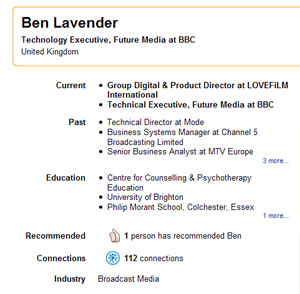 Ben Lavender, the person who came up with the idea behind the BBC iPlayer, originally called iMP, is leaving the BBC this afternoon.
Ben Lavender, the person who came up with the idea behind the BBC iPlayer, originally called iMP, is leaving the BBC this afternoon.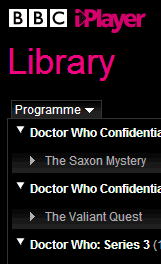 Finally the BBC Trust appears to be open to talking about the iPlayer going Open Source.
Finally the BBC Trust appears to be open to talking about the iPlayer going Open Source.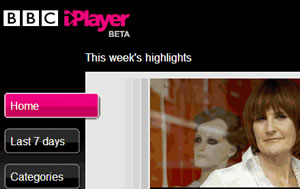 This morning, BBC boss Mark Thompson announced that the corporation’s long-awaited iPlayer on-demand TV service would launch, as an open public beta, on 27 July this year.
This morning, BBC boss Mark Thompson announced that the corporation’s long-awaited iPlayer on-demand TV service would launch, as an open public beta, on 27 July this year.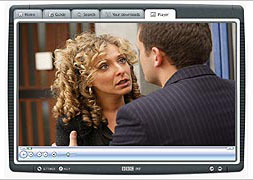 The BBC Trust has given the go ahead for the BBC’s iPlayer service (iMP).
The BBC Trust has given the go ahead for the BBC’s iPlayer service (iMP).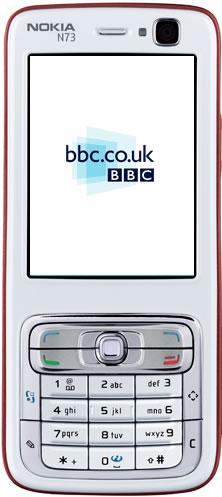 Three UK operators will be taking part, Orange, Vodafone and 3 giving subscribers to the trial the ability to watch BBC One, BBC News 24 and BBC Three streamed on their mobiles. Beyond some sports programmes and programmes where they don’t have the necessary rights.
Three UK operators will be taking part, Orange, Vodafone and 3 giving subscribers to the trial the ability to watch BBC One, BBC News 24 and BBC Three streamed on their mobiles. Beyond some sports programmes and programmes where they don’t have the necessary rights. The BBC has signed a Memorandum of Understanding with Microsoft. Areas of the potential investigation and collaboration that the non-exclusive agreement includes, covers “search and navigation, distribution, and content enablement” (what ever that means in English).
The BBC has signed a Memorandum of Understanding with Microsoft. Areas of the potential investigation and collaboration that the non-exclusive agreement includes, covers “search and navigation, distribution, and content enablement” (what ever that means in English). Microsoft has been creeping into the BBC’s online media for a long time now. It first came to light when we broke the story near the start of 2004 that the
Microsoft has been creeping into the BBC’s online media for a long time now. It first came to light when we broke the story near the start of 2004 that the  ‘The Apprentice’ TV show has been a smash hit in the UK, much the same as it was in the US. The BBC now plan to use it as the ‘first extensive broadband experience,’ as part of the BBC TV Plus project.
‘The Apprentice’ TV show has been a smash hit in the UK, much the same as it was in the US. The BBC now plan to use it as the ‘first extensive broadband experience,’ as part of the BBC TV Plus project.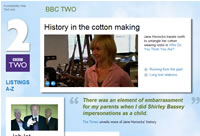 Initially looking at these advances it’s easy to get excited, but when looked in context of how long it’s taken, a frustrations come to the surface.
Initially looking at these advances it’s easy to get excited, but when looked in context of how long it’s taken, a frustrations come to the surface. (Funnily enough, after reading that article the person responsible for the project contacted us and it turned out to be someone whose previous work outside the BBC we’d been very impressed with.)
(Funnily enough, after reading that article the person responsible for the project contacted us and it turned out to be someone whose previous work outside the BBC we’d been very impressed with.) Despite so much current talk from the UK Telco’s and Sky on the magic that will provide an on demand broadcast TV proposition in the UK, tangible evidence of a working model beyond KiT in Hull and Homechoice is pretty sparse.
Despite so much current talk from the UK Telco’s and Sky on the magic that will provide an on demand broadcast TV proposition in the UK, tangible evidence of a working model beyond KiT in Hull and Homechoice is pretty sparse.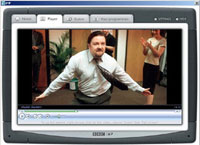 Despite the somewhat limited selection of programmes, which I’m told is largely down to copyright issues, it seems a positive move for a public sector broadcaster actually providing a service and solving the ‘problem’ of letting you see a programme you forgot to record or you later discover is worth viewing.
Despite the somewhat limited selection of programmes, which I’m told is largely down to copyright issues, it seems a positive move for a public sector broadcaster actually providing a service and solving the ‘problem’ of letting you see a programme you forgot to record or you later discover is worth viewing.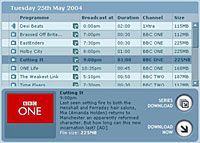 The BBC is thinking beyond the present Windows-only solution. Speaking recently in London the BBC’s Project Director for iMP Ben Lavender reinforced the BBC philosophy of platform agnosticism and spoke of the desire to work on Apple and Linux solutions when DRM issues can be satisfactorily dealt with.
The BBC is thinking beyond the present Windows-only solution. Speaking recently in London the BBC’s Project Director for iMP Ben Lavender reinforced the BBC philosophy of platform agnosticism and spoke of the desire to work on Apple and Linux solutions when DRM issues can be satisfactorily dealt with.